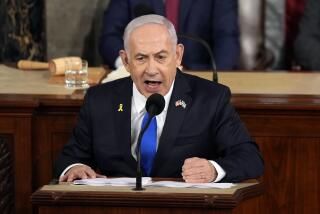Boeing Bests Lockheed for U.S. Rocket Deal
- Share via
Boeing Co. on Friday beat out Lockheed Martin Corp. for the bulk of a $3-billion Air Force rocket contract, a deal that will stabilize the jobs picture at Boeing’s Huntington Beach space unit.
The unit was awarded a contract to provide new and less-expensive expendable rockets for 19 military and cargo missions between 2002 and 2006, while Maryland-based Lockheed got nine. Two missions that were part of the initial 30-launch package were not awarded.
Boeing’s dominance in the Air Force competition is likely to give it a marketing advantage as the space giants compete for more lucrative commercial contracts to loft communications satellites, scientific missions and global navigation equipment into space.
Boeing, which has announced plans to slash its payroll by as many as 28,000 jobs in the next two years, also said the contract will stabilize employment in the launch-vehicle division, which now employs 6,700 people.
Government launches are expected to account for only about 25% of the expendable-rocket business in what is expected to be a $70-billion market over the next decade.
Air Force officials did not say why they picked Boeing for the lion’s share of the first in what is likely to be an ongoing series of launch contracts for which the companies will compete.
Both Boeing and Lockheed, which announced layoff plans earlier this year, said they had staffed for the expendable-launch program and do not expect to do more hiring. Boeing has 8,700 employees assigned to the program, including 6,300 in Huntington Beach and 975 in Monrovia. Lockheed officials said most of the employees assigned to their program are in Colorado.
Boeing received $1.38 billion for its 19 launches, while Lockheed received $650 million for its share. The funds include covering the costs of preparing launch pads and other work at Vandenberg Air Force Base, near Lompoc, and Cape Canaveral Air Force Station in Florida.
In addition, each company received $500 million to help offset development costs of the so-called EELV, or Evolved Expendable Launch Vehicle.
An expendable-launch vehicle is the most commonly used rocket, the major parts of which burn up after launch and cannot be recycled. Boeing and other companies also are working on development of reusable rockets that land intact, much like the space shuttle, when they have completed their missions.
Jacques Gansler, the Pentagon’s undersecretary of defense acquisition and technology, predicted the new EELV systems would save taxpayers $5 billion to $10 billion over the life of the program.
Program specifications call for the two companies to use a common booster core, a standard launch pad and standardized payload organization and processing, all geared to produce lower launch costs.
Lockheed officials tried to put the best face on the company’s showing Friday. Astronautics division President Raymond S. Colladay admitted being “disappointed in the award” but said that the EELV is a core business for Lockheed and the company expects it to increase over time, especially in the civilian market.
At Boeing’s expendable launch systems unit--the former McDonnell Douglas Corp. space division that the Seattle company acquired last year--General Manager Gale Schluter said the contract demonstrates that Boeing’s new Delta IV family of rockets will “compete well in the world market.”
Boeing will launch the first Delta IV rocket for a commercial client in 2001.
The aviation giant was especially jubilant because half the launches will be for rockets carrying medium or heavy payloads, for which the Delta IV was developed. The company has not had a strong presence in this arena.
Friday’s contract awards followed a development program that began in 1995.
Last November, the Air Force said it would introduce competition across the life of the program so the two firms would compete for shares of the work at each successive stage.
The contract was announced after the New York Stock Exchange closed. Boeing shares ended the day at $32.25, down $1.69, while Lockheed Martin stock closed up 13 cents at $108.69.
*
Times staff writer Ashley Dunn contributed to this report.
More to Read
Inside the business of entertainment
The Wide Shot brings you news, analysis and insights on everything from streaming wars to production — and what it all means for the future.
You may occasionally receive promotional content from the Los Angeles Times.









